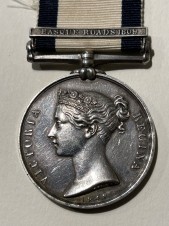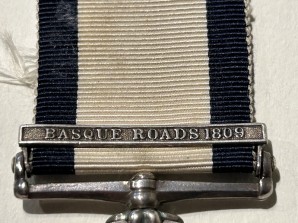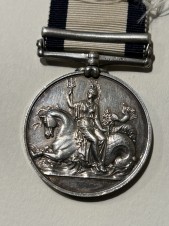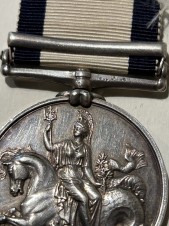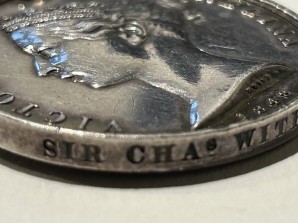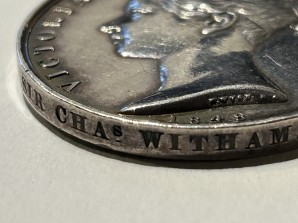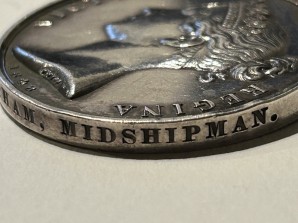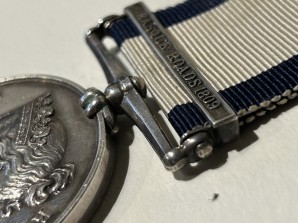NGS CLASP BASQUE ROADS 1809 , NAMED SIR CHAS WITHAM, MIDSHIPMAN
Stock No. 132493
Product Information
Out of Stock
MEDAL IN GOOD ORDER AND CORRECTLY NAMED, THE SUSPENSION A LITTLE LOOSE – AS WITH ALL OUR NGS’S DUE TO VALUE PART EXCHANGES FOR OTHER MEDALS OR MILITARIA WELCOME. GOOD OFFERS INVITED.
The excellent Naval General Service Medal 1793-1840, 1 Clasp: Basque Roads 1809, awarded to Midshipman later Lieutenant Sir Charles Witham, Kt. Royal Navy. Witham was from the ancient Yorkshire family of Witham of Cliffe, but with the Napoleonic War, joined the Royal Navy as a Volunteer 1st Class aboard the 80 gun warship Gibraltar in May 1808, joining the ship at the same time as his brother, Francis Witham. In fact both brothers would be with this ship when under Captain Henry Lidgbird Ball, she fought under Admiral Gambier at the Battle of the Basque Roads at the mouth of the Charente River on the Biscay coast of France. The action lasted from 11th to 24th April 1809, and whilst not as crippling as it could have been, nevertheless saw three French ships of the line, a fourth-rate and a frigate destroyed and much of the remainder of the Brest fleet badly damaged and requiring extensive repairs. French casualties in the engagement are estimated at 150–200, while British losses were only 13 killed and 30 wounded. Allemand later wrote that most significant damage resulting from the battle was to the morale of the French fleet; he wrote that “the greater part are disheartened; every day I hear them lamenting their situation, and speaking in praise of their enemy.” No British ships suffered more than minor damage in the two weeks of combat, and the fleet could return to its blockade with the knowledge that the Brest fleet was neutralised for some time to come. This was the last time during the Napoleonic Wars that a significant French fleet was able to put to sea from the Atlantic ports. As a result of this action, without naval support, the French colonies in the Caribbean were isolated, blockaded, invaded and captured shortly afterwards. The officers and men of Gibraltar found themselves most actively engaged when Lord Cochrane attacked with the fire ships on 11th April, Gibraltar’s crew and officers helped man the fireships, which were limited in the damage they caused by a boom placed across the channel. Witham would become one of 10 officers and 24 ratings from the Gibraltar would live to claim the clasp ‘Basque Roads 1809’, and in all 518 clasps would be issued to surviving claimant’s from the Royal Navy / Royal Marines. His brother, Francis Witham, would also be present for the action at Basque Roads, but would not live to claim the clasp. Witham did not take part in any other major action during the Napoleonic War with France but would find himself involved in the War of 1812 with the Americans, when aboard the 58 gun warship Newcastle operating in Boston Bay. Newcastle was commanded by Captain Lord George Stuart, and shared in the proceeds of the capture on 28th December 1814 of the notorious American privateer Prince de Neufchatel. By early 1815 she was watching the United States heavy frigate USS Constitution, then in harbour at Boston. When Constitution and two other heavy frigates left Boston, Newcastle gave chase with the British squadron which eventually sighted Constitution in heavy weather off Porto Praya on 11th March 1815. She was proceeding with two prizes, the sloops Levant and Cyane. Due to the weather and some confusion, Constitution eluded the British. Fire from Newcastle led Levant’s crew to run her ashore, where Acasta then captured her. Constitution however successfully returned to port. Witham would remained in the Royal Navy until placed on half pay in 1831, his last appointment having been as First Lieutenant of the 24 gun frigate Semiramis, the flagship of Rear Admiral the Honourable Sir Charles Paget, which vessel was stationed at Cork, Ireland. He was there when he received the honour of Knighthood as a Knight Bachelor on 8th October 1830, the title being presented to him by the Lord Lieutenant.

